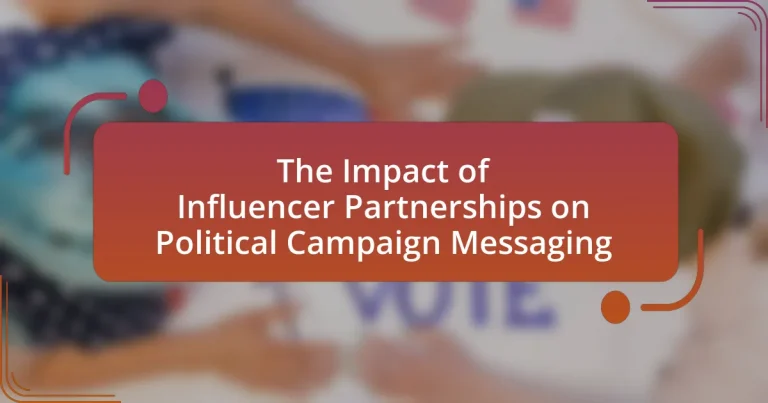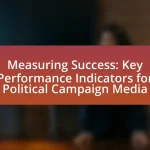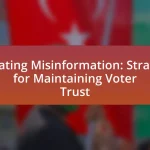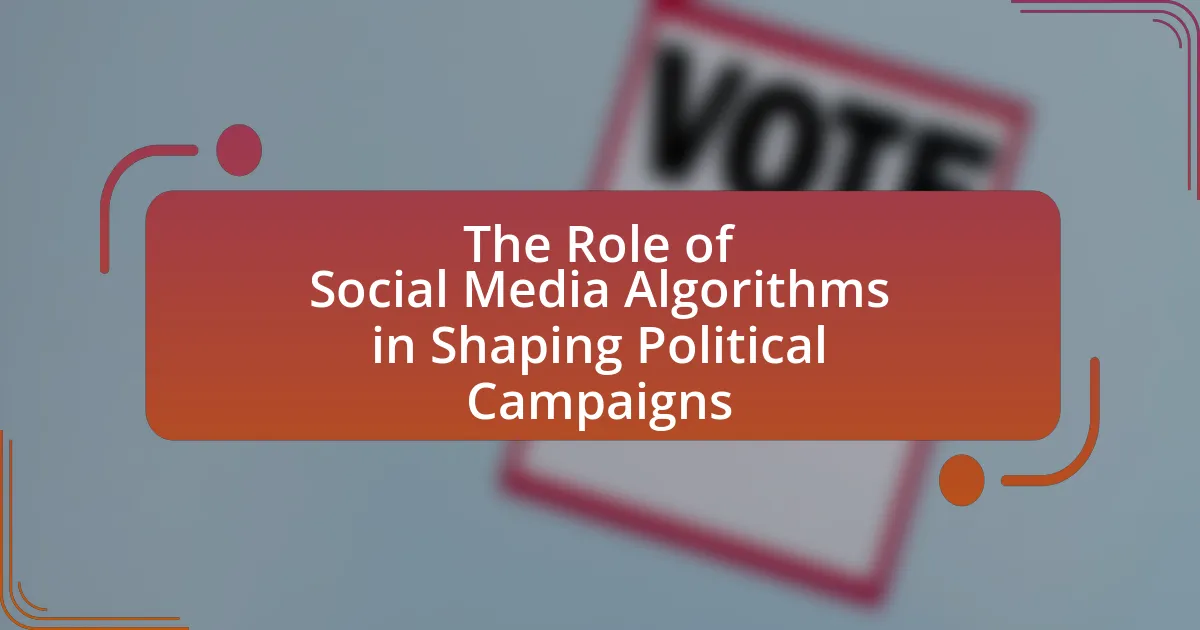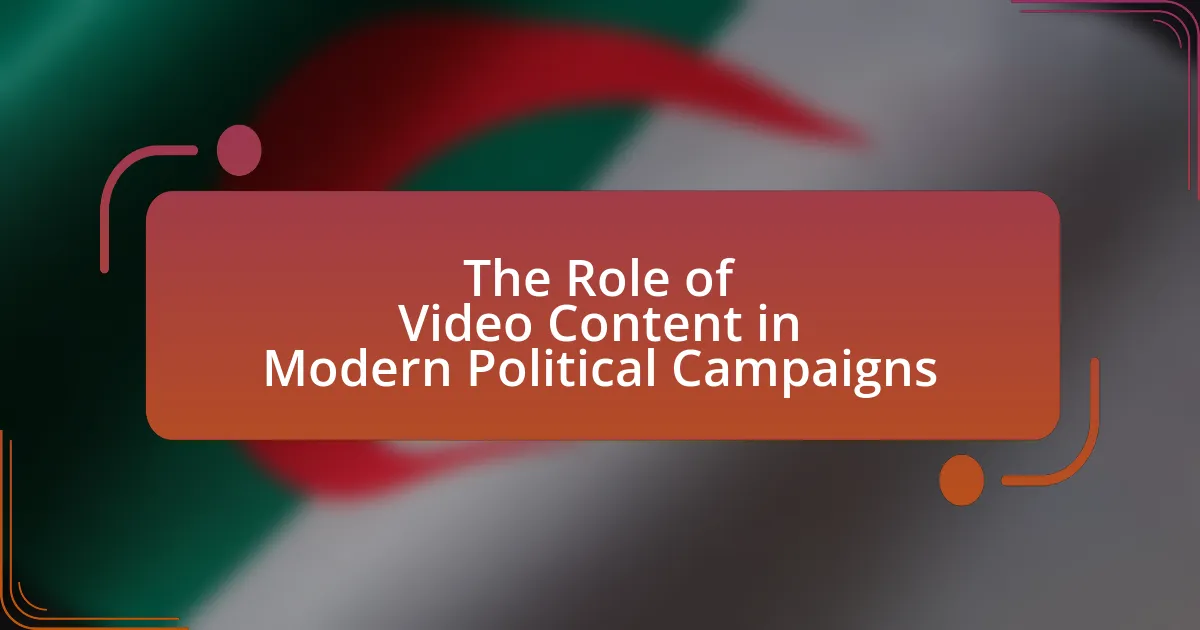The article examines the impact of influencer partnerships on political campaign messaging, highlighting their effectiveness in enhancing reach and engagement, particularly among younger voters. It presents research indicating that campaigns utilizing influencers can achieve significantly higher engagement rates compared to traditional advertising methods. The article discusses how influencers shape political strategies, influence voter perception, and mobilize electoral participation, while also addressing the challenges and ethical considerations associated with these partnerships. Additionally, it outlines best practices for selecting and engaging influencers to ensure authentic and effective political messaging.
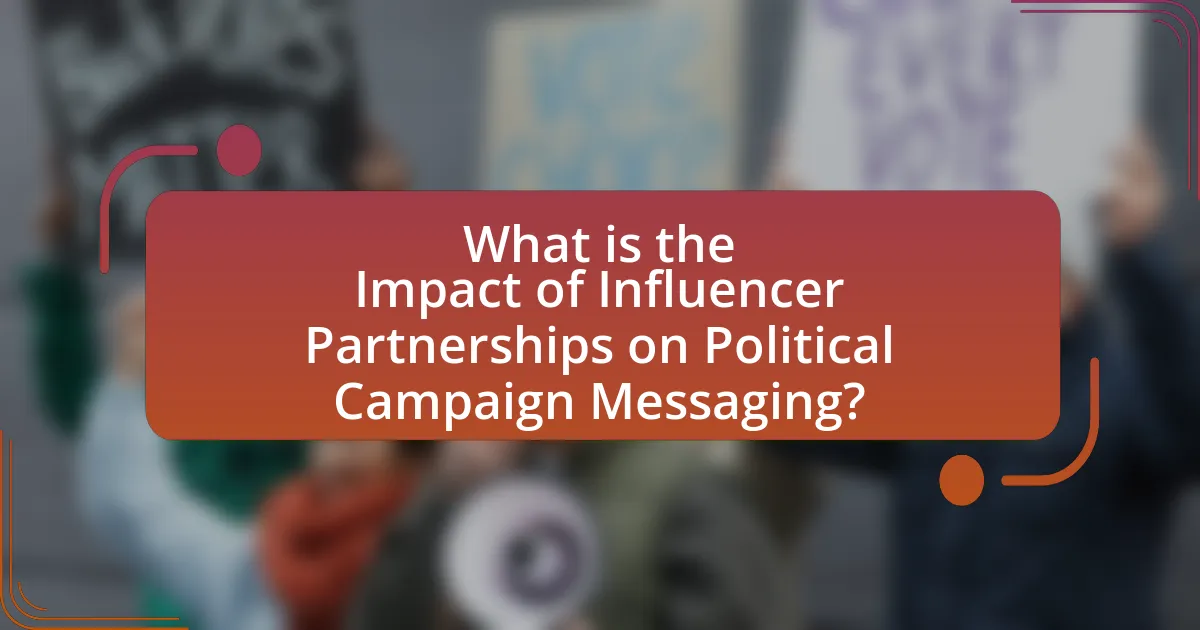
What is the Impact of Influencer Partnerships on Political Campaign Messaging?
Influencer partnerships significantly enhance political campaign messaging by increasing reach and engagement among target demographics. Research indicates that campaigns utilizing influencers can achieve up to a 10 times higher engagement rate compared to traditional advertising methods. This effectiveness stems from influencers’ established trust and credibility with their audiences, which can lead to more authentic and persuasive messaging. For instance, a study by the Pew Research Center found that 70% of young voters are influenced by social media personalities when making political decisions. Thus, influencer partnerships not only amplify campaign messages but also foster a deeper connection with voters, ultimately shaping public perception and voter behavior.
How do influencer partnerships shape political campaign strategies?
Influencer partnerships shape political campaign strategies by enhancing outreach and engagement with target demographics. Political campaigns leverage influencers’ established credibility and follower trust to disseminate messages more effectively, particularly among younger voters who are increasingly disengaged from traditional media. For instance, during the 2020 U.S. presidential election, candidates like Joe Biden utilized influencers on platforms such as Instagram and TikTok to reach millions of potential voters, resulting in increased voter registration and turnout among younger age groups. This strategy is supported by data indicating that 70% of teens trust influencers more than traditional celebrities, demonstrating the significant impact influencers have on shaping public perception and mobilizing electoral participation.
What roles do influencers play in political messaging?
Influencers play a crucial role in political messaging by shaping public opinion and increasing engagement among target demographics. They leverage their established credibility and reach on social media platforms to disseminate political messages, often framing issues in a relatable manner that resonates with their followers. For instance, during the 2020 U.S. presidential election, influencers significantly impacted voter turnout, particularly among younger audiences, by promoting voter registration and participation through platforms like Instagram and TikTok. Research from the Pew Research Center indicates that 55% of young voters reported being influenced by social media personalities in their voting decisions, highlighting the effectiveness of influencers in mobilizing political action.
How do influencers affect voter perception and engagement?
Influencers significantly shape voter perception and engagement by leveraging their credibility and reach to communicate political messages. Research indicates that influencers can enhance voter awareness and interest, particularly among younger demographics, by presenting political content in relatable formats. For example, a study by the Pew Research Center found that 55% of social media users aged 18-29 reported that they learned about political issues through influencers. This engagement often translates into increased voter turnout, as influencers encourage their followers to participate in elections and civic activities.
Why are influencer partnerships becoming essential in political campaigns?
Influencer partnerships are becoming essential in political campaigns because they effectively reach and engage younger, digitally-savvy voters. Research indicates that 70% of teenagers trust influencers more than traditional celebrities, making influencers a powerful tool for shaping public opinion and mobilizing support. Additionally, influencers can create authentic connections with their audiences, which enhances the relatability of political messages and fosters a sense of community around campaign issues. This trend is supported by the increasing use of social media platforms, where influencers can amplify campaign messages rapidly and efficiently, leading to higher voter turnout and engagement.
What trends are driving the rise of influencer partnerships in politics?
The rise of influencer partnerships in politics is primarily driven by the increasing importance of social media in shaping public opinion. Social media platforms have become essential for political communication, allowing influencers to reach large, engaged audiences quickly. According to a 2021 Pew Research Center study, 53% of U.S. adults reported getting news from social media, highlighting its role in information dissemination. Additionally, influencers often possess a level of trust and relatability that traditional politicians may lack, making their endorsements more impactful. This trend is further supported by the fact that campaigns leveraging influencer partnerships have seen increased voter engagement and turnout, as evidenced by the 2020 U.S. elections where candidates utilized influencers to mobilize younger voters effectively.
How do demographic shifts influence the effectiveness of these partnerships?
Demographic shifts significantly influence the effectiveness of influencer partnerships in political campaign messaging by altering the target audience’s preferences and engagement levels. As populations change in age, ethnicity, and socioeconomic status, the influencers who resonate with these demographics also shift, necessitating campaigns to adapt their strategies. For instance, a study by the Pew Research Center indicates that younger voters, who are increasingly diverse, prefer authentic and relatable influencers, which can enhance message reception and mobilization. Therefore, understanding these demographic trends allows political campaigns to select influencers who can effectively communicate their messages to the evolving electorate, ultimately improving campaign outcomes.
What challenges do political campaigns face when partnering with influencers?
Political campaigns face several challenges when partnering with influencers, primarily related to authenticity, message alignment, and audience perception. Authenticity is crucial; if influencers do not genuinely support the campaign’s values, their endorsement may appear insincere, leading to backlash. Message alignment is another challenge; campaigns must ensure that the influencer’s content and messaging are consistent with their political goals to avoid mixed signals. Additionally, audience perception can be problematic; followers of influencers may have differing political views, which can alienate potential voters. According to a study by the Pew Research Center, 70% of social media users believe that influencers should be transparent about their partnerships, highlighting the importance of authenticity in these collaborations.
What ethical considerations arise from influencer partnerships?
Influencer partnerships raise several ethical considerations, primarily concerning transparency, authenticity, and the potential for manipulation. Transparency is crucial, as influencers must disclose paid partnerships to ensure that their audience understands the nature of the content. The Federal Trade Commission (FTC) mandates that influencers clearly label sponsored posts to prevent misleading their followers. Authenticity is another concern; influencers may promote products or political messages that do not align with their genuine beliefs, leading to distrust among their audience. Additionally, the potential for manipulation arises when influencers leverage their platforms to sway public opinion without disclosing their affiliations or the financial incentives behind their endorsements. This can distort democratic processes, particularly in political campaigns, where the authenticity of messages is vital for informed voter decision-making.
How can campaigns mitigate risks associated with influencer collaborations?
Campaigns can mitigate risks associated with influencer collaborations by conducting thorough vetting of influencers to ensure alignment with campaign values and audience. This involves analyzing the influencer’s past content, audience engagement metrics, and public perception to avoid potential backlash. For instance, a study by the Digital Marketing Institute found that 70% of consumers are more likely to trust a brand when it partners with an influencer who shares similar values. Additionally, campaigns should establish clear contracts outlining expectations, deliverables, and compliance with advertising regulations to minimize legal risks. By implementing these strategies, campaigns can effectively reduce the likelihood of negative outcomes from influencer partnerships.
How do influencer partnerships compare to traditional political messaging?
Influencer partnerships are generally more effective than traditional political messaging in reaching and engaging younger audiences. Research indicates that 70% of teenagers trust influencers more than traditional celebrities, which enhances the credibility of political messages delivered through these partnerships. Additionally, influencer content often appears more authentic and relatable, leading to higher engagement rates; for instance, posts by influencers can achieve engagement rates of up to 3-5%, compared to less than 1% for traditional political advertisements. This shift in trust and engagement underscores the growing importance of influencer partnerships in modern political campaigns.
What metrics are used to evaluate the success of influencer partnerships in campaigns?
Metrics used to evaluate the success of influencer partnerships in campaigns include engagement rate, reach, conversion rate, and return on investment (ROI). Engagement rate measures the level of interaction (likes, comments, shares) relative to the audience size, indicating how well the content resonates with viewers. Reach quantifies the total number of unique users who see the content, providing insight into the campaign’s visibility. Conversion rate tracks the percentage of users who take a desired action, such as signing up or donating, reflecting the effectiveness of the influencer’s message. ROI assesses the financial return generated from the partnership compared to the costs incurred, helping to determine overall campaign profitability. These metrics collectively provide a comprehensive view of the influencer partnership’s impact on campaign success.
How can campaigns measure the impact of influencer messaging on voter turnout?
Campaigns can measure the impact of influencer messaging on voter turnout through a combination of tracking engagement metrics, conducting surveys, and analyzing voting data. By monitoring social media interactions, such as likes, shares, and comments on influencer posts, campaigns can gauge the level of audience engagement and interest generated by the messaging. Additionally, pre- and post-campaign surveys can assess changes in voter intention and awareness directly linked to influencer content. Finally, comparing voter turnout rates in demographics targeted by influencer campaigns against those not exposed to such messaging provides concrete evidence of influence. For instance, a study by the Pew Research Center found that social media messaging significantly affects political engagement, indicating that effective influencer partnerships can lead to increased voter turnout.
What tools and analytics are available for assessing influencer effectiveness?
Tools and analytics available for assessing influencer effectiveness include social media analytics platforms, engagement metrics, and sentiment analysis tools. Social media analytics platforms like Hootsuite and Sprout Social provide insights into follower demographics, engagement rates, and content performance, allowing campaigns to evaluate how well influencers resonate with their audience. Engagement metrics, such as likes, shares, comments, and click-through rates, quantify the interaction levels with influencer content, indicating its effectiveness in driving audience action. Sentiment analysis tools, such as Brandwatch and Mention, analyze audience reactions to influencer posts, providing qualitative data on public perception and emotional response, which is crucial for understanding the impact of influencer partnerships on political messaging.
What best practices should political campaigns follow when engaging influencers?
Political campaigns should prioritize authenticity and alignment with influencers when engaging them. Authenticity ensures that the influencer’s audience perceives the campaign message as genuine, which can enhance trust and engagement. For instance, a study by the Digital Marketing Institute found that 70% of millennials are influenced by the recommendations of their peers, highlighting the importance of selecting influencers whose values resonate with the campaign’s message. Additionally, campaigns should establish clear communication and expectations with influencers to ensure that the messaging aligns with the campaign’s goals while allowing the influencer to maintain their unique voice. This approach fosters a collaborative relationship that can lead to more effective outreach and engagement with voters.
How can campaigns select the right influencers for their messaging goals?
Campaigns can select the right influencers for their messaging goals by analyzing the influencer’s audience demographics, engagement rates, and alignment with the campaign’s values. Research indicates that influencers with a strong connection to their followers can drive higher engagement, which is crucial for effective messaging. For instance, a study by the Digital Marketing Institute found that 49% of consumers depend on influencer recommendations, highlighting the importance of choosing influencers whose audiences match the campaign’s target demographic. Additionally, campaigns should evaluate the influencer’s previous content to ensure it resonates with the intended messaging, as alignment in values can enhance authenticity and trust.
What strategies enhance the authenticity of influencer partnerships?
Strategies that enhance the authenticity of influencer partnerships include selecting influencers whose values align with the brand, fostering genuine relationships, and encouraging creative freedom in content creation. When brands choose influencers that share similar beliefs and ethics, it creates a more believable narrative for the audience. Research indicates that 61% of consumers trust influencer recommendations more than brand advertisements, highlighting the importance of authenticity in these partnerships. Additionally, allowing influencers to express their unique voice and style leads to more relatable and engaging content, further strengthening the connection with their audience.
